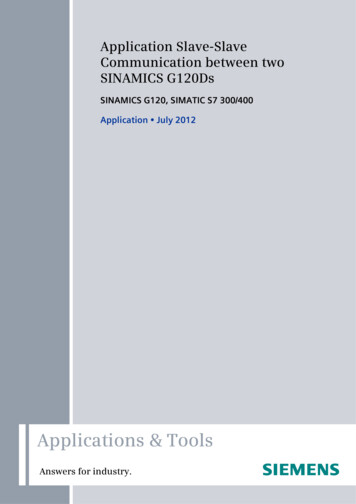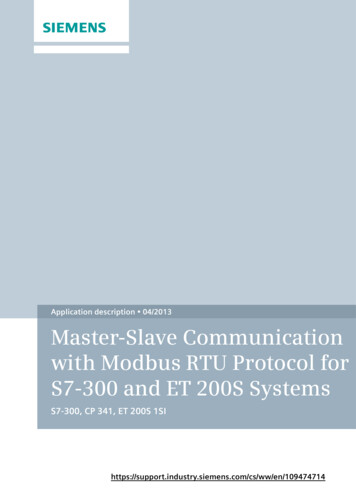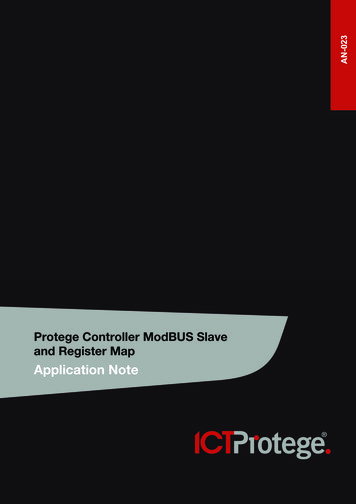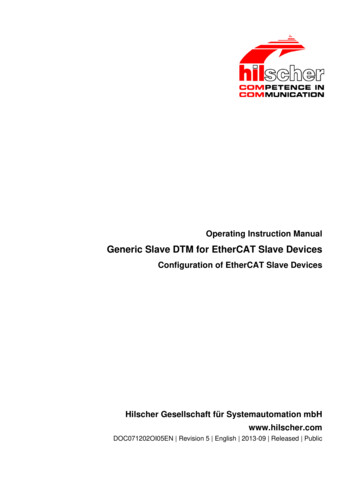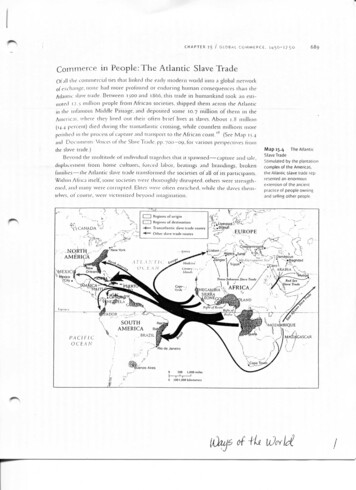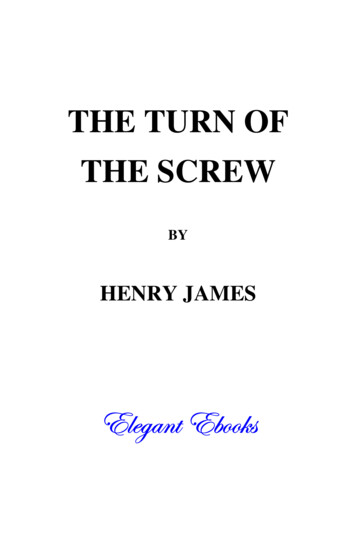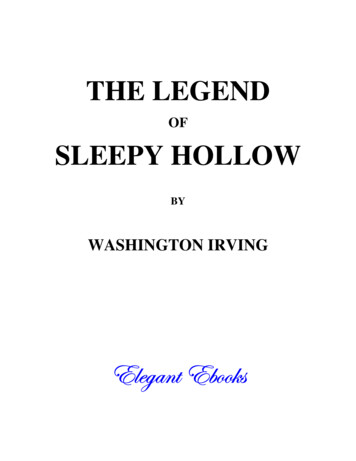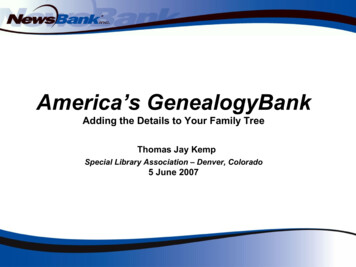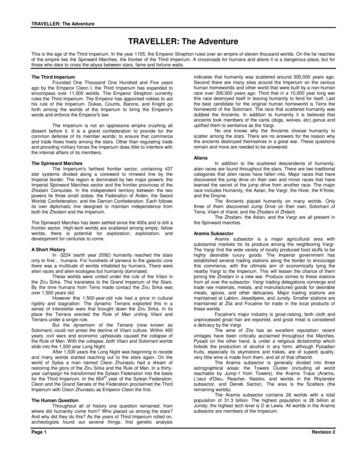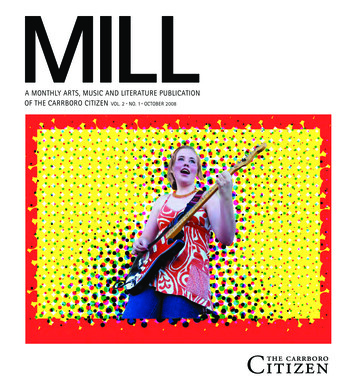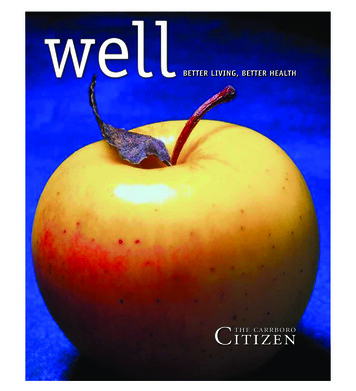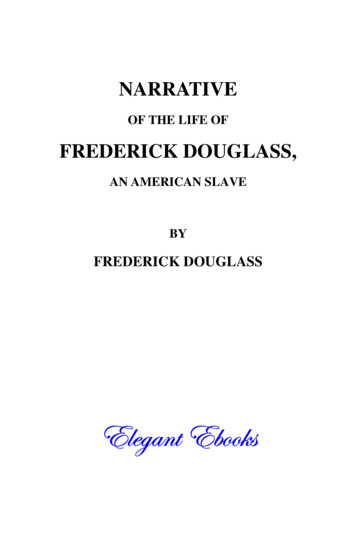
Transcription
NARRATIVEOF THE LIFE OFFREDERICK DOUGLASS,AN AMERICAN SLAVEBYFREDERICK DOUGLASS7 WYS f f 77 T a a ] e
NARRATIVEOF THELIFEOFFREDERICK DOUGLASS,ANAMERICAN SLAVE.WRITTEN BY HIMSELF.BOSTONPUBLISHED AT THE ANTI-SLAVERY OFFICE,NO. 25 CORNHILL1845
Entered, according to Act of Congress, in the year 1845,BY FREDERICK DOUGLASS,in the Clerk’s Office of the District Court of Massachusetts.COPYRIGHT INFORMATIONBook: Narrative of the Life of Frederick DouglassAuthor: Frederick Douglass, 1817?–95First published: 1845The original book is in the public domain in the UnitedStates and in most, if not all, other countries as well. Readersoutside the United States should check their own countries’copyright laws to be certain they can legally download thisebook. The Online Books Page has an FAQ which gives asummary of copyright durations for many other countries, aswell as links to more official sources.This PDF ebook wascreated by José Menéndez.
PREFACE.IN the month of August, 1841, I attended an anti-slaveryconvention in Nantucket, at which it was my happiness tobecome acquainted with FREDERICK DOUGLASS, the writer ofthe following Narrative. He was a stranger to nearly everymember of that body; but, having recently made his escape fromthe southern prison-house of bondage, and feeling his curiosityexcited to ascertain the principles and measures of theabolitionists,—of whom he had heard a somewhat vaguedescription while he was a slave,—he was induced to give hisattendance, on the occasion alluded to, though at that time aresident in New Bedford.Fortunate, most fortunate occurrence!—fortunate for themillions of his manacled brethren, yet panting for deliverancefrom their awful thraldom!—fortunate for the cause of negroemancipation, and of universal liberty!—fortunate for the landof his birth, which he has already done so much to save andbless!—fortunate for a large circle of friends and acquaintances,whose sympathy and affection he has strongly secured by themany sufferings he has endured, by his virtuous traits ofcharacter, by his ever-abiding remembrance of those who are inbonds, as being bound with them!—fortunate for the multitudes,in various parts of our republic, whose minds he has enlightenedon the subject of slavery, and who have been melted to tears byhis pathos, or roused to virtuous indignation by his stirringeloquence against the enslavers of men!—fortunate for himself,as it at once brought him into the field of public usefulness,
viPREFACE“gave the world assurance of a MAN,” quickened the slumberingenergies of his soul, and consecrated him to the great work ofbreaking the rod of the oppressor, and letting the oppressed gofree!I shall never forget his first speech at the convention—theextraordinary emotion it excited in my own mind—the powerfulimpression it created upon a crowded auditory, completelytaken by surprise—the applause which followed from thebeginning to the end of his felicitous remarks. I think I neverhated slavery so intensely as at that moment; certainly, myperception of the enormous outrage which is inflicted by it, onthe godlike nature of its victims, was rendered far more clearthan ever. There stood one, in physical proportion and staturecommanding and exact—in intellect richly endowed—in naturaleloquence a prodigy—in soul manifestly “created but a littlelower than the angels”—yet a slave, ay, a fugitive slave,—trembling for his safety, hardly daring to believe that on theAmerican soil, a single white person could be found who wouldbefriend him at all hazards, for the love of God and humanity!Capable of high attainments as an intellectual and moralbeing—needing nothing but a comparatively small amount ofcultivation to make him an ornament to society and a blessing tohis race—by the law of the land, by the voice of the people, bythe terms of the slave code, he was only a piece of property, abeast of burden, a chattel personal, nevertheless!A beloved friend from New Bedford prevailed on Mr.DOUGLASS to address the convention. He came forward to theplatform with a hesitancy and embarrassment, necessarily theattendants of a sensitive mind in such a novel position. Afterapologizing for his ignorance, and reminding the audience thatslavery was a poor school for the human intellect and heart, heproceeded to narrate some of the facts in his own history as aslave, and in the course of his speech gave utterance to many
PREFACEviinoble thoughts and thrilling reflections. As soon as he had takenhis seat, filled with hope and admiration, I rose, and declaredthat PATRICK HENRY, of revolutionary fame, never made aspeech more eloquent in the cause of liberty, than the one wehad just listened to from the lips of that hunted fugitive. So Ibelieved at that time—such is my belief now. I reminded theaudience of the peril which surrounded this self-emancipatedyoung man at the North,—even in Massachusetts, on the soil ofthe Pilgrim Fathers, among the descendants of revolutionarysires; and I appealed to them, whether they would ever allowhim to be carried back into slavery,—law or no law,constitution or no constitution. The response was unanimousand in thunder-tones—“NO!” “Will you succor and protect himas a brother-man—a resident of the old Bay State?” “YES!”shouted the whole mass, with an energy so startling, that theruthless tyrants south of Mason and Dixon’s line might almosthave heard the mighty burst of feeling, and recognized it as thepledge of an invincible determination, on the part of those whogave it, never to betray him that wanders, but to hide theoutcast, and firmly to abide the consequences.It was at once deeply impressed upon my mind, that, if Mr.DOUGLASS could be persuaded to consecrate his time andtalents to the promotion of the anti-slavery enterprise, apowerful impetus would be given to it, and a stunning blow atthe same time inflicted on northern prejudice against a coloredcomplexion. I therefore endeavored to instil hope and courageinto his mind, in order that he might dare to engage in avocation so anomalous and responsible for a person in hissituation; and I was seconded in this effort by warm-heartedfriends, especially by the late General Agent of theMassachusetts Anti-Slavery Society, Mr. JOHN A. COLLINS,whose judgment in this instance entirely coincided with myown. At first, he could give no encouragement; with unfeigned
viiiPREFACEdiffidence, he expressed his conviction that he was not adequateto the performance of so great a task; the path marked out waswholly an untrodden one; he was sincerely apprehensive that heshould do more harm than good. After much deliberation,however, he consented to make a trial; and ever since thatperiod, he has acted as a lecturing agent, under the auspiceseither of the American or the Massachusetts Anti-SlaverySociety. In labors he has been most abundant; and his success incombating prejudice, in gaining proselytes, in agitating thepublic mind, has far surpassed the most sanguine expectationsthat were raised at the commencement of his brilliant career. Hehas borne himself with gentleness and meekness, yet with truemanliness of character. As a public speaker, he excels in pathos,wit, comparison, imitation, strength of reasoning, and fluency oflanguage. There is in him that union of head and heart, which isindispensable to an enlightenment of the heads and a winning ofthe hearts of others. May his strength continue to be equal to hisday! May he continue to “grow in grace, and in the knowledgeof God,” that he may be increasingly serviceable in the cause ofbleeding humanity, whether at home or abroad!It is certainly a very remarkable fact, that one of the mostefficient advocates of the slave population, now before thepublic, is a fugitive slave, in the person of FREDERICKDOUGLASS; and that the free colored population of the UnitedStates are as ably represented by one of their own number, inthe person of CHARLES LENOX REMOND, whose eloquentappeals have extorted the highest applause of multitudes onboth sides of the Atlantic. Let the calumniators of the coloredrace despise themselves for their baseness and illiberality ofspirit, and henceforth cease to talk of the natural inferiority ofthose who require nothing but time and opportunity to attain tothe highest point of human excellence.
PREFACEixIt may, perhaps, be fairly questioned, whether any otherportion of the population of the earth could have endured theprivations, sufferings and horrors of slavery, without havingbecome more degraded in the scale of humanity than the slavesof African descent. Nothing has been left undone to cripple theirintellects, darken their minds, debase their moral nature,obliterate all traces of their relationship to mankind; and yethow wonderfully they have sustained the mighty load of a mostfrightful bondage, under which they have been groaning forcenturies! To illustrate the effect of slavery on the white man,—to show that he has no powers of endurance, in such acondition, superior to those of his black brother,—DANIELO’CONNELL, the distinguished advocate of universalemancipation, and the mightiest champion of prostrate but notconquered Ireland, relates the following anecdote in a speechdelivered by him in the Conciliation Hall, Dublin, before theLoyal National Repeal Association, March 31, 1845. “Nomatter,” said Mr. O’CONNELL, “under what specious term itmay disguise itself, slavery is still hideous. It has a natural, aninevitable tendency to brutalize every noble faculty of man. AnAmerican sailor, who was cast away on the shore of Africa,where he was kept in slavery for three years, was, at theexpiration of that period, found to be imbruted and stultified—he had lost all reasoning power; and having forgotten his nativelanguage, could only utter some savage gibberish betweenArabic and English, which nobody could understand, and whicheven he himself found difficulty in pronouncing. So much forthe humanizing influence of THE DOMESTIC INSTITUTION!”Admitting this to have been an extraordinary case of mentaldeterioration, it proves at least that the white slave can sink aslow in the scale of humanity as the black one.Mr. DOUGLASS has very properly chosen to write his ownNarrative, in his own style, and according to the best of his
xPREFACEability, rather than to employ some one else. It is, therefore,entirely his own production; and, considering how long anddark was the career he had to run as a slave,—how few havebeen his opportunities to improve his mind since he broke hisiron fetters,—it is, in my judgment, highly creditable to his headand heart. He who can peruse it without a tearful eye, a heavingbreast, an afflicted spirit,—without being filled with anunutterable abhorrence of slavery and all its abettors, andanimated with a determination to seek the immediate overthrowof that execrable system,—without trembling for the fate of thiscountry in the hands of a righteous God, who is ever on the sideof the oppressed, and whose arm is not shortened that it cannotsave,—must have a flinty heart, and be qualified to act the partof a trafficker “in slaves and the souls of men.” I am confidentthat it is essentially true in all its statements; that nothing hasbeen set down in malice, nothing exaggerated, nothing drawnfrom the imagination; that it comes short of the reality, ratherthan overstates a single fact in regard to SLAVERY AS IT IS. Theexperience of FREDERICK DOUGLASS, as a slave, was not apeculiar one; his lot was not especially a hard one; his case maybe regarded as a very fair specimen of the treatment of slaves inMaryland, in which State it is conceded that they are better fedand less cruelly treated than in Georgia, Alabama, or Louisiana.Many have suffered incomparably more, while very few on theplantations have suffered less, than himself. Yet how deplorablewas his situation! what terrible chastisements were inflictedupon his person! what still more shocking outrages wereperpetrated upon his mind! with all his noble powers andsublime aspirations, how like a brute was he treated, even bythose professing to have the same mind in them that was inChrist Jesus! to what dreadful liabilities was he continuallysubjected! how destitute of friendly counsel and aid, even in hisgreatest extremities! how heavy was the midnight of woe which
PREFACExishrouded in blackness the last ray of hope, and filled the futurewith terror and gloom! what longings after freedom tookpossession of his breast, and how his misery augmented, inproportion as he grew reflective and intelligent,—thusdemonstrating that a happy slave is an extinct man! how hethought, reasoned, felt, under the lash of the driver, with thechains upon his limbs! what perils he encountered in hisendeavors to escape from his horrible doom! and how signalhave been his deliverance and preservation in the midst of anation of pitiless enemies!This Narrative contains many affecting incidents, manypassages of great eloquence and power; but I think the mostthrilling one of them all is the description DOUGLASS gives ofhis feelings, as he stood soliloquizing respecting his fate, andthe chances of his one day being a freeman, on the banks of theChesapeake Bay—viewing the receding vessels as they flewwith their white wings before the breeze, and apostrophizingthem as animated by the living spirit of freedom. Who can readthat passage, and be insensible to its pathos and sublimity?Compressed into it is a whole Alexandrian library of thought,feeling, and sentiment—all that can, all that need be urged, inthe form of expostulation, entreaty, rebuke, against that crime ofcrimes,—making man the property of his fellow-man! O, howaccursed is that system, which entombs the godlike mind ofman, defaces the divine image, reduces those who by creationwere crowned with glory and honor to a level with four-footedbeasts, and exalts the dealer in human flesh above all that iscalled God! Why should its existence be prolonged one hour? Isit not evil, only evil, and that continually? What does itspresence imply but the absence of all fear of God, all regard forman, on the part of the people of the United States? Heavenspeed its eternal overthrow!
xiiPREFACESo profoundly ignorant of the nature of slavery are manypersons, that they are stubbornly incredulous whenever theyread or listen to any recital of the cruelties which are dailyinflicted on its victims. They do not deny that the slaves areheld as property; but that terrible fact seems to convey to theirminds no idea of injustice, exposure to outrage, or savagebarbarity. Tell them of cruel scourgings, of mutilations andbrandings, of scenes of pollution and blood, of the banishmentof all light and knowledge, and they affect to be greatlyindignant at such enormous exaggerations, such wholesalemisstatements, such abominable libels on the character of thesouthern planters! As if all these direful outrages were not thenatural results of slavery! As if it were less cruel to reduce ahuman being to the condition of a thing, than to give him asevere flagellation, or to deprive him of necessary food andclothing! As if whips, chains, thumb-screws, paddles,bloodhounds, overseers, drivers, patrols, were not allindispensable to keep the slaves down, and to give protection totheir ruthless oppressors! As if, when the marriage institution isabolished, concubinage, adultery, and incest, must notnecessarily abound; when all the rights of humanity areannihilated, any barrier remains to protect the victim from thefury of the spoiler; when absolute power is assumed over lifeand liberty, it will not be wielded with destructive sway!Skeptics of this character abound in society. In some fewinstances, their incredulity arises from a want of reflection; but,generally, it indicates a hatred of the light, a desire to shieldslavery from the assaults of its foes, a contempt of the coloredrace, whether bond or free. Such will try to discredit theshocking tales of slaveholding cruelty which are recorded in thistruthful Narrative; but they will labor in vain. Mr. DOUGLASShas frankly disclosed the place of his birth, the names of thosewho claimed ownership in his body and soul, and the names
PREFACExiiialso of those who committed the crimes which he has allegedagainst them. His statements, therefore, may easily bedisproved, if they are untrue.In the course of his Narrative, he relates two instances ofmurderous cruelty,—in one of which a planter deliberately shota slave belonging to a neighboring plantation, who hadunintentionally gotten within his lordly domain in quest of fish;and in the other, an overseer blew out the brains of a slave whohad fled to a stream of water to escape a bloody scourging. Mr.DOUGLASS states that in neither of these instances was any thingdone by way of legal arrest or judicial investigation. TheBaltimore American, of March 17, 1845, relates a similar caseof atrocity, perpetrated with similar impunity—as follows:—“Shooting a slave.—We learn, upon the authority of a letterfrom Charles county, Maryland, received by a gentleman of thiscity, that a young man, named Matthews, a nephew of GeneralMatthews, and whose father, it is believed, holds an office atWashington, killed one of the slaves upon his father’s farm byshooting him. The letter states that young Matthews had beenleft in charge of the farm; that he gave an order to the servant,which was disobeyed, when he proceeded to the house,obtained a gun, and, returning, shot the servant. Heimmediately, the letter continues, fled to his father’s residence,where he still remains unmolested.”—Let it never be forgotten,that no slaveholder or overseer can be convicted of any outrageperpetrated on the person of a slave, however diabolical it maybe, on the testimony of colored witnesses, whether bond or free.By the slave code, they are adjudged to be as incompetent totestify against a white man, as though they were indeed a part ofthe brute creation. Hence, there is no legal protection in fact,whatever there may be in form, for the slave population; andany amount of cruelty may be inflicted on them with impunity.
xivPREFACEIs it possible for the human mind to conceive of a more horriblestate of society?The effect of a religious profession on the conduct ofsouthern masters is vividly described in the following Narrative,and shown to be any thing but salutary. In the nature of the case,it must be in the highest degree pernicious. The testimony ofMr. DOUGLASS, on this point, is sustained by a cloud ofwitnesses, whose veracity is unimpeachable. “A slaveholder’sprofession of Christianity is a palpable imposture. He is a felonof the highest grade. He is a man-stealer. It is of no importancewhat you put in the other scale.”Reader! are you with the man-stealers in sympathy andpurpose, or on the side of their down-trodden victims? If withthe former, then are you the foe of God and man. If with thelatter, what are you prepared to do and dare in their behalf? Befaithful, be vigilant, be untiring in your efforts to break everyyoke, and let the oppressed go free. Come what may—cost whatit may—inscribe on the banner which you unfurl to the breeze,as your religious and political motto—“NO COMPROMISE WITHSLAVERY! NO UNION WITH SLAVEHOLDERS!”WM. LLOYD GARRISON.BOSTON, May 1, 1845.
LETTERFROM WENDELL PHILLIPS, ESQ.BOSTON, April 22, 1845.My Dear Friend:You remember the old fable of “The Man andthe Lion,” where the lion complained that he should not be somisrepresented “when the lions wrote history.”I am glad the time has come when the “lions write history.”We have been left long enough to gather the character ofslavery from the involuntary evidence of the masters. Onemight, indeed, rest sufficiently satisfied with what, it is evident,must be, in general, the results of such a relation, withoutseeking farther to find whether they have followed in everyinstance. Indeed, those who stare at the half-peck of corn aweek, and love to count the lashes on the slave’s back, areseldom the “stuff” out of which reformers and abolitionists areto be made. I remember that, in 1838, many were waiting forthe results of the West India experiment, before they couldcome into our ranks. Those “results” have come long ago; but,alas! few of that number have come with them, as converts. Aman must be disposed to judge of emancipation by other teststhan whether it has increased the produce of sugar,—and to hateslavery for other reasons than because it starves men and whipswomen,—before he is ready to lay the first stone of his antislavery life.
xviLETTER FROM WENDELL PHILLIPS, ESQ.I was glad to learn, in your story, how early the mostneglected of God’s children waken to a sense of their rights, andof the injustice done them. Experience is a keen teacher; andlong before you had mastered your A B C, or knew where the“white sails” of the Chesapeake were bound, you began, I see,to gauge the wretchedness of the slave, not by his hunger andwant, not by his lashes and toil, but by the cruel and blightingdeath which gathers over his soul.In connection with this, there is one circumstance whichmakes your recollections peculiarly valuable, and renders yourearly insight the more remarkable. You come from that part ofthe country where we are told slavery appears with its fairestfeatures. Let us hear, then, what it is at its best estate—gaze onits bright side, if it has one; and then imagination may task herpowers to add dark lines to the picture, as she travels southwardto that (for the colored man) Valley of the Shadow of Death,where the Mississippi sweeps along.Again, we have known you long, and can put the mostentire confidence in your truth, candor, and sincerity. Every onewho has heard you speak has felt, and, I am confident, everyone who reads your book will feel, persuaded that you givethem a fair specimen of the whole truth. No one-sidedportrait,—no wholesale complaints,—but strict justice done,whenever individual kindliness has neutralized, for a moment,the deadly system with which it was strangely allied. You havebeen with us, too, some years, and can fairly compare thetwilight of rights, which your race enjoy at the North, with that“noon of night” under which they labor south of Mason andDixon’s line. Tell us whether, after all, the half-free coloredman of Massachusetts is worse off than the pampered slave ofthe rice swamps!In reading your life, no one can say that we have unfairlypicked out some rare specimens of cruelty. We know that the
LETTER FROM WENDELL PHILLIPS, ESQ.xviibitter drops, which even you have drained from the cup, are noincidental aggravations, no individual ills, but such as mustmingle always and necessarily in the lot of every slave. Theyare the essential ingredients, not the occasional results, of thesystem.After all, I shall read your book with trembling for you.Some years ago, when you were beginning to tell me your realname and birthplace, you may remember I stopped you, andpreferred to remain ignorant of all. With the exception of avague description, so I continued, till the other day, when youread me your memoirs. I hardly knew, at the time, whether tothank you or not for the sight of them, when I reflected that itwas still dangerous, in Massachusetts, for honest men to telltheir names! They say the fathers, in 1776, signed theDeclaration of Independence with the halter about their necks.You, too, publish your declaration of freedom with dangercompassing you around. In all the broad lands which theConstitution of the United States overshadows, there is nosingle spot,—however narrow or desolate,—where a fugitiveslave can plant himself and say, “I am safe.” The whole armoryof Northern Law has no shield for you. I am free to say that, inyour place, I should throw the MS. into the fire.You, perhaps, may tell your story in safety, endeared asyou are to so many warm hearts by rare gifts, and a still rarerdevotion of them to the service of others. But it will be owingonly to your labors, and the fearless efforts of those who,trampling the laws and Constitution of the country under theirfeet, are determined that they will “hide the outcast,” and thattheir hearths shall be, spite of the law, an asylum for theoppressed, if, some time or other, the humblest may stand in ourstreets, and bear witness in safety against the cruelties of whichhe has been the victim.
xviiiLETTER FROM WENDELL PHILLIPS, ESQ.Yet it is sad to think, that these very throbbing hearts whichwelcome your story, and form your best safeguard in telling it,are all beating contrary to the “statute in such case made andprovided.” Go on, my dear friend, till you, and those who, likeyou, have been saved, so as by fire, from the dark prison-house,shall stereotype these free, illegal pulses into statutes; and NewEngland, cutting loose from a blood-stained Union, shall gloryin being the house of refuge for the oppressed;—till we nolonger merely “hide the outcast,” or make a merit of standingidly by while he is hunted in our midst; but, consecrating anewthe soil of the Pilgrims as an asylum for the oppressed, proclaimour welcome to the slave so loudly, that the tones shall reachevery hut in the Carolinas, and make the broken-heartedbondman leap up at the thought of old Massachusetts.God speed the day!Till then, and ever,Yours truly,WENDELL PHILLIPS.FREDERICK DOUGLASS.
NARRATIVEOF THELIFE OF FREDERICK DOUGLASS.CHAPTER I.I WAS born in Tuckahoe, near Hillsborough, and abouttwelve miles from Easton, in Talbot county, Maryland. I haveno accurate knowledge of my age, never having seen anyauthentic record containing it. By far the larger part of theslaves know as little of their ages as horses know of theirs, andit is the wish of most masters within my knowledge to keeptheir slaves thus ignorant. I do not remember to have ever met aslave who could tell of his birthday. They seldom come nearerto it than planting-time, harvest-time, cherry-time, spring-time,or fall-time. A want of information concerning my own was asource of unhappiness to me even during childhood. The whitechildren could tell their ages. I could not tell why I ought to bedeprived of the same privilege. I was not allowed to make anyinquiries of my master concerning it. He deemed all suchinquiries on the part of a slave improper and impertinent, andevidence of a restless spirit. The nearest estimate I can givemakes me now between twenty-seven and twenty-eight years ofage. I come to this, from hearing my master say, some timeduring 1835, I was about seventeen years old.My mother was named Harriet Bailey. She was thedaughter of Isaac and Betsey Bailey, both colored, and quite
2NARRATIVE OF THEdark. My mother was of a darker complexion than either mygrandmother or grandfather.My father was a white man. He was admitted to be such byall I ever heard speak of my parentage. The opinion was alsowhispered that my master was my father; but of the correctnessof this opinion, I know nothing; the means of knowing waswithheld from me. My mother and I were separated when I wasbut an infant—before I knew her as my mother. It is a commoncustom, in the part of Maryland from which I ran away, to partchildren from their mothers at a very early age. Frequently,before the child has reached its twelfth month, its mother istaken from it, and hired out on some farm a considerabledistance off, and the child is placed under the care of an oldwoman, too old for field labor. For what this separation is done,I do not know, unless it be to hinder the development of thechild’s affection toward its mother, and to blunt and destroy thenatural affection of the mother for the child. This is theinevitable result.I never saw my mother, to know her as such, more thanfour or five times in my life; and each of these times was veryshort in duration, and at night. She was hired by a Mr. Stewart,who lived about twelve miles from my home. She made herjourneys to see me in the night, travelling the whole distance onfoot, after the performance of her day’s work. She was a fieldhand, and a whipping is the penalty of not being in the field atsunrise, unless a slave has special permission from his or hermaster to the contrary—a permission which they seldom get,and one that gives to him that gives it the proud name of being akind master. I do not recollect of ever seeing my mother by thelight of day. She was with me in the night. She would lie downwith me, and get me to sleep, but long before I waked she wasgone. Very little communication ever took place between us.Death soon ended what little we could have while she lived, and
LIFE OF FREDERICK DOUGLASS3with it her hardships and suffering. She died when I was aboutseven years old, on one of my master’s farms, near Lee’s Mill. Iwas not allowed to be present during her illness, at her death, orburial. She was gone long before I knew any thing about it.Never having enjoyed, to any considerable extent, her soothingpresence, her tender and watchful care, I received the tidings ofher death with much the same emotions I should have probablyfelt at the death of a stranger.Called thus suddenly away, she left me without the slightestintimation of who my father was. The whisper that my masterwas my father, may or may not be true; and, true or false, it is ofbut little consequence to my purpose whilst the fact remains, inall its glaring odiousness, that slaveholders have ordained, andby law established, that the children of slave women shall in allcases follow the condition of their mothers; and this is done tooobviously to administer to their own lusts, and make agratification of their wicked desires profitable as well aspleasurable; for by this cunning arrangement, the slaveholder, incases not a few, sustains to his slaves the double relation ofmaster and father.I know of such cases; and it is worthy of remark that suchslaves invariably suffer greater hardships, and have more tocontend with, than others. They are, in the first place, a
narrative of the life of frederick douglass, an american slave by frederick douglass 7 wys f7taa]e. narrative of the life of frederick douglass, an american slave. w ritten by himself. boston published at the anti-slavery office, no. 25 cornhill . this pdf ebook was created by josé menéndez. preface. in the month of august, .File Size: 798KB
